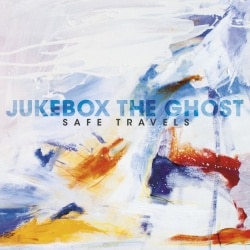Artist: Jukebox the Ghost
Album: Safe Travels
Jukebox the Ghost are a power-pop band. By this I mean they’re energetic; they sing about normal pop topics (loneliness, awkward crushes, relationships); their male singer sounds young and basically ordinary but carries tunes well; they play guitar and bass and  keyboards and drums; they use clean production; and they rise and fall based on the strength of their melodies. They’re “pop” in the sense that this was an excellent way to become popular in the 1960s and ’70s, and many of us (including some like me who weren’t even around for that) still vaguely assume it should be.
keyboards and drums; they use clean production; and they rise and fall based on the strength of their melodies. They’re “pop” in the sense that this was an excellent way to become popular in the 1960s and ’70s, and many of us (including some like me who weren’t even around for that) still vaguely assume it should be.
Jukebox the Ghost’s Safe Travels, in high-energy mode, reminds me of early Elton John: there’s confident piano, or keyboard sounds that often fit the ’70s, strutting through these songs, and singer Ben Thornewill can pull off a Crocodile Rock-like falsetto. But of course Elton’s records also had all those ballads, even from the start. Safe Travels‘s slow songs feel different from his. Dead and All for Love are dramatic buildups that end up massive, and Devils on Our Side is a mostly understated solo piano performance until the cello arrives, circling around waiting for a tip; if you didn’t like them, it would more likely be that they felt too emo — raw drama arranged and digitized for easy replay — than too schmaltzy. Man in the Moon is mostly voice and sketchy acoustic guitar. The Spiritual, white gospel singing over piano, that could be Elton.
But I’m mostly here for the rock songs. And honestly, Elton John didn’t always write verses this strong, soaring into new keys for the chorus and leaving room for a distinctive, tuneful bridge; sometimes, but not this reliably. Also Jukebox the Ghost have some good lyrics (who knows what Elton’s partner Bernie Taupin was writing about?). At Last — my choice for a single, switching between stylish percussive verses and over-the-top chorus with strings, plus a nifty guitar solo — sets up a romance-to-be. “He was a songwriter writing songs about a girl/ She was a ghostwriter lying to the world/ in deep anticipation of a day that she had written/ and by her own admission, she’d be picked up, kissed, and twirled”. It gets a detailed eager-but-anxious middle, and a happy (nay, jubilant) ending that feels earned. Say When (excellent piano-synthesizer interaction) is a detailed song about hating parties, that doubles as a pick-up line that also deserves to work.
Dead is, one hopes, not autobiographical yet, but it’s vivid: “Maybe it was just the sleeping pills when I went to bed last night/ Maybe I just never made it home; and what if there’s always been/ a tiny, tiny hole inside my heart leaking very very very very slowly? And if you’re dead, how do you know if you are really dead/ or stuck in a dull dream about nothing that never ends?” I admire the modesty of its urgent plea: “We all, at minimum, deserve a unique exit from this world/ So if you’re there, God, see to it”. Until which, the potentially depressing Adulthood — “In my lungs I still feel young, but my body won’t play along … Each one’s waiting for the chance/ to be lifted off the ground, but then/ to discover that we’ll all be dust again” — is sung and played to make “I dare you to survive/ being grown for the rest of your life” sound like an honest challenge worth some energy. Which it is. Especially with some nice peppy music around to perk us up.
– Brian Block
To see the rest of our favorites, visit our Favorite Albums of 2012 page!
